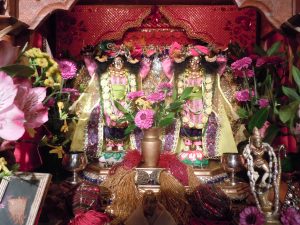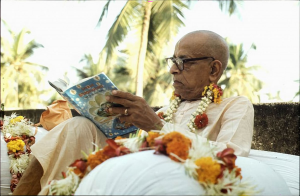SF lecture Feb 10 1966
Excerpt from class on Lord Caitanya talking about his experience with his spiritual master ordering Him to chant Hare Krsna Mantra. This was addressed to Prakasananda Sarasvati, the mayavadi sannyasi.
Prabhupada mentions the actual symptoms of Love of God will develop in such a chanter. These symptoms of transcendental emotion are far above material religiosity.
Please read on if interested…
Hare Krsna
dd
——————————
” ‘This chanting makes Me obliged to laugh and dance and sing.’ So when My spiritual master heard Me, he replied as follows.”
Now the spiritual master is explaining, “Yes, this is the right result of chanting Hare Kṛṣṇa. Unless You come to this emotional stage, transcendental emotional stage
What are the four perfectional stage? In the material world there are supposed to be four perfectional stage of human life. What is that? First perfectional stage is that when one becomes very expert in following the religious principles. That is also another perfectional stage of common man. You have got your principles of religions, say, either Hindu or Muslim or Christian or Jew. You have got your own Bible or Testament or Koran or Vedas. There are rules and regulation, rituals, everything. So one who follows those rules and regulations, they are called religionist. And what is the effect of becoming religionist? The effect is that you can live very peacefully without any material want. Simply by following the rules and regulation of your scripture, it doesn’t matter in which religion you belong to, but if you follow the rules and regulation, then your life will be peaceful and there will be no material want. That is not, of course, peaceful. You cannot expect any peace in this material world because the major problem is birth, death, old age and disease. So you cannot check this. But somehow or other, your life will be peaceful and more than those, I mean to say, upstarts who do not follow any rules and regulation. You’ll be in better position, far better position than them. So this is one perfection, to become a man of religiosity.
Then, if you become a man of religiosity, then your economic wants will be almost nil. Dharma, artha and kāma.
Because we have got this material idea, sense gratification, and the last word in the sense gratification is sex life. That’s all. So if we think that “Going to that place, I will have free sex life and beautiful man, beautiful woman, and nice drinking, nice eating,” oh, so materialists, they think, “This is perfection of life. This is perfection of life.”
So dharma, artha, kāma,and the last stage is salvation. Salvationists. What are the salvationists? When a person becomes frustrated by become a man of religiosity, a rich man of economic development, and satisfaction of sense gratification, when he, one has seen that all these things has not given him any peace of mind, then he wants to become out of this scene and become one with the Supreme. This is called salvationist. So somebody is thinking void, somebody is thinking impersonal Brahman. So the last stage is to become extinguished in the void or impersonalism. That is called salvation. Salvation from this material entanglement.
So general people, they have got these four kinds of ideas: religiosity, economic development, sense gratification, and at last monism, or become one with the Supreme. That’s all. ….
So Kṛṣṇa, but Caitanya Mahāprabhu says that this emotion, by chanting Hare Kṛṣṇa, developing love of God, is far, far beyond these four principles of perfection, above the idea of becoming one with the Supreme.
This pañcama puru… This is fifth dimension. One, religiosity; two, economic development; and three, sense gratification; and four, to become one with the Supreme. So above these four, this is fifth. This is the fifth stage of perfection. What is that? Developing love of Godhead and getting emotion out of that. So Caitanya Mahāprabhu says this emotional stage is so transcendental and so elevated that there is no comparison with the other four principles. The perfection of the other four principles is enjoy to become one with Brahman. CaitanyaMahāprab
Bhāgye sei premā tomāya karila
Now these are some of the stages explained, and each item is very important. Sveda: when actually one comes to the perfectional stage of emotion, there is perspiration, perspiration from the body, sveda.Kampa: there is shaking of the body, like this. Yes. Shaking of the body.Romāñca: the hairs stands on the holes, romāñca. Gadgada: he fails to speak. He cannot express his words exactly. Vaivarṇya: there is sometimes paleness of the body. Unmāda: just like a madman. Viṣāda:he becomes morose, very sorry, viṣāda. Dhairya: and calm and quiet. Then garva: he becomes pride, sometimes just like a chivalrous man, pride, proud. Harṣa: ecstasy. And dainya: and humble, humbleness. So these are the symptoms of perfection. So sometimes they imitate. So imitation is no good. It will come. When you are in perfectional stage, these symptoms will automatically come.
“All these symptoms means that he is floating in the transcendental ocean of joy, of loving Kṛṣṇa.” That is the actual experience of love. Just like you love somebody, when he comes, meets you, embrace you, oh, you have got some, a particular emotion, similarly, these emotions means that you are in the perfectional stage of chan
So His spiritual master said, “So it is very nice, my dear Caitanya. You have developed all these symptoms. So I am also obliged to You because I initiated You. Now You are so perfectional stage, in aperfectional stage, so I am thinking myself, also, proud, that I have got a disciple like You. Or You have been benefited by me.” So His spiritual master said like that.
Now here is another order. The first order is that “You chant.” And when the disciple (is) in the perfectional stage, the spiritual master orders that “Yes, continue this chanting.” Nāca, gāo, bha
So this injunction is received, as Caitanya Mahāprabhu says, that “First of all make your life perfect. Don’t try to preach without becoming yourself perfect.” The nonsense thing is going on in this world that so-called preachers, they have not perfected their life, but they have become preachers. They have not already perfected their life, and they have become preacher. Therefore they are bringing so many nonsense things and misleading persons, Vedāntists and VedāntaSociety, yogis, this or that. But they are not themselves perfect. SoCaitanya Mahāprabhu said that “Before becoming preacher, before endeavoring yourself to do good to others, you just perfect yourself.” “Physician, heal thyself.” Physician, you are yourself diseased. How you can become a physician? People will, at once, will be detracted, “Oh, this doctor, this medical man, he’s suffering from fever, and he’s treating my fever.” So there will be no, I mean to say, effect.SoCaitanya Mahāprabhu says, or His spiritual master says, that kṛṣṇa–nāma upadeśi’ tāra’ sarva–jana: “First of all You have perfected Yourself by chanting Hare Kṛṣṇa. You have come to the perfectionalstage. Now You have got the symptoms of emotion. Now You can preach Hare Kṛṣṇa, Hare Kṛṣṇa,
Now Caitanya Mahāprabhu says that “My spiritual master, after instructing Me in this way, he has taught Me one very nice verse from the Śrīmad-Bhāgavata.” What is that?
evaṁ vrataḥ sva–priya–nāma–kīr
jātānurāgo druta–citta uccaiḥ
hasaty atho roditi rauti
unmādavan nṛtyati loka–bāhyaḥ
jātānurāgo druta–citta uccaiḥ
hasaty atho roditi rauti
unmādavan nṛtyati loka–bāhyaḥ
When one becomes actually devoted to Kṛṣṇa consciousness and takes pleasure by chanting his object of love, druta–citta uccaiḥ, his mind becomes perturbed by such chanting. And then hasaty, hasaty, he laughs; atho roditi, sometimes cries, roditi; and rauti, and, by seeing him, others also cry; roditi, rauti; gāyati,
Now Caitanya Mahāprabhu





